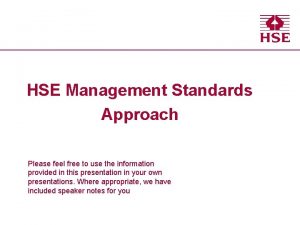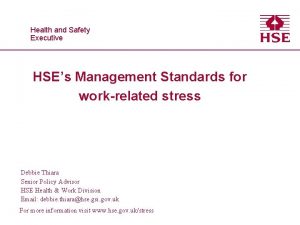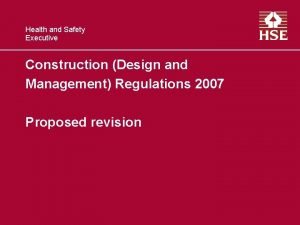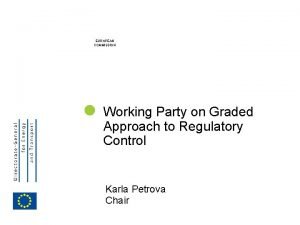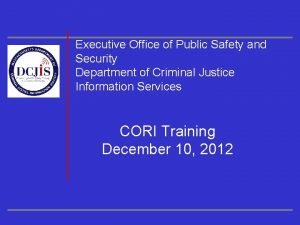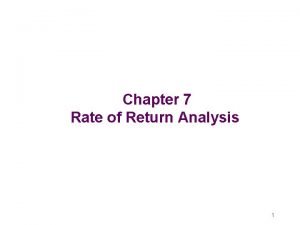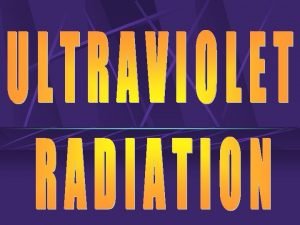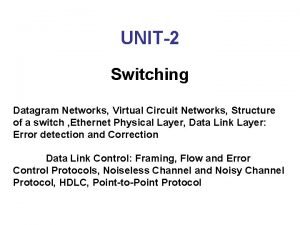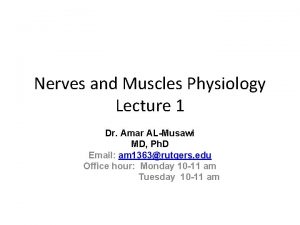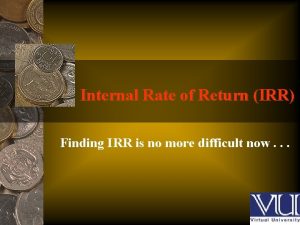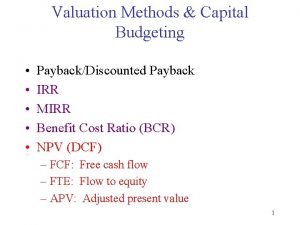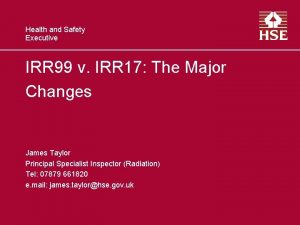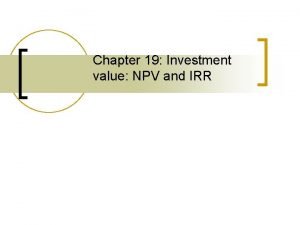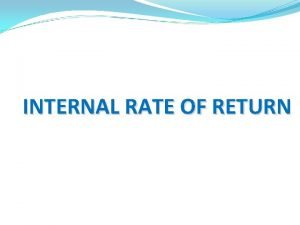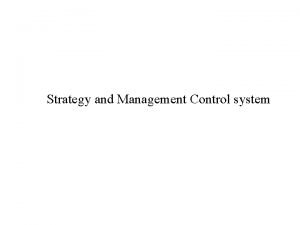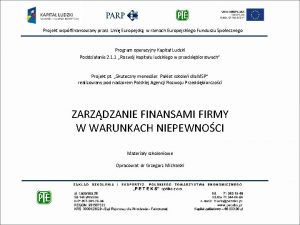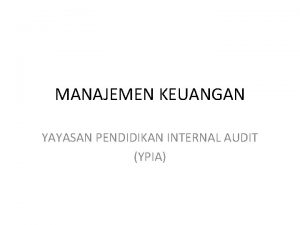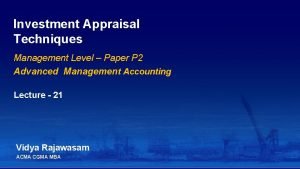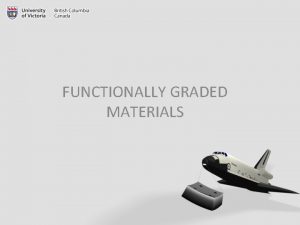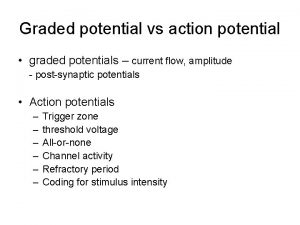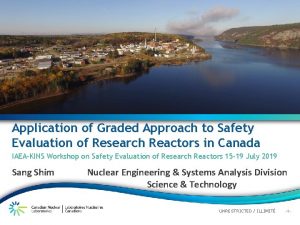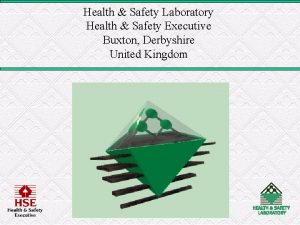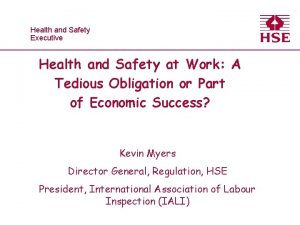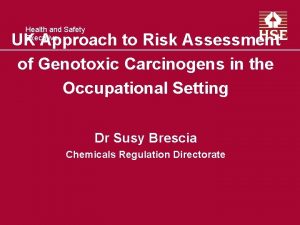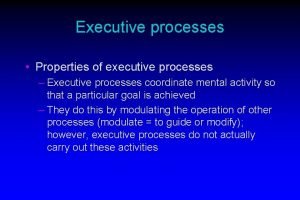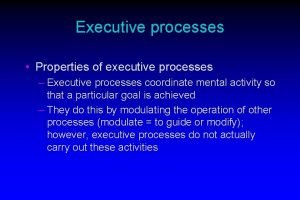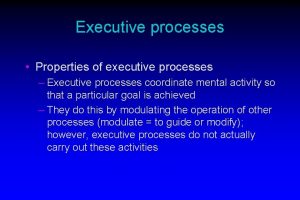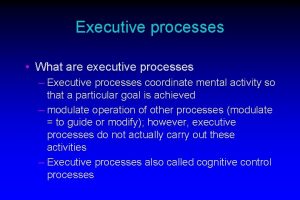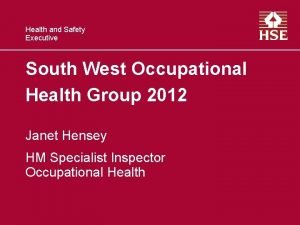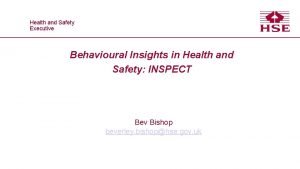Health and Safety Executive IRR 17 Graded Approach













































- Slides: 45

Health and Safety Executive IRR 17: Graded Approach Questions…. . and Answers. James Taylor Principal Specialist Inspector (Radiation) Tel: 07879 661820 e. mail: james. taylor@hse. gov. uk

Employers 1 • Q. What happens if I use the wrong employer on the registration/consent application? • A. If the true employer is ABC plc and they'd actually applied as ABC Ltd or simply as ABC then it is a false declaration and they would need to reapply

Employers 2 • Q. On the subject of legal entities another is LA run schools. Are these schools a separate entity for declarations, therefore each school needs to apply or is it the LA and therefore one application for the LA as a whole? • A. If a group of schools is LA run, in other words the employees of all the schools have one employer, the LA, then the LA need make only one application/declaration for the group.

Employers 3 • Q. Also at that other address a surgeon rents our rooms he is a separate business from ours, would he be covered under our notification because he is using the same equipment or does he need to register his practice independently? • A. No, he is not covered as the surgeon is a different employer or is self-employed and is not under your direction or control. The surgeon will need to register.

Employers 4 • Q. Similar enquiries where the employees of one company are working with equipment that is owned by another company on that other company’s site • A. It doesn’t matter who owns/hires the equipment or where it is located. It is who operates it that is the key. So, if an employer has an employee operating Xray equipment then that employer needs to register

Applications • Q. I am looking to apply for consent for a group within the ***** organisation based in the Netherlands. They would like to carry out site radiography in the UK sometime in the near future and, as RPA to ***** in the UK, I am looking to complete the application in conjunction with them / on their behalf. • A. You should not apply on their behalf. The employer themselves should complete the application

Registration and Consent • Q. If the NHS have a consent for a Cs 137 HASS source then they realise they have another small non HASS Cs-137 source do they need to get a separate registration for that? • A. Yes

Registration 1 • Q. Which employer should register this xray unit: The site is owned by Trust A. The radiology staff are employed by Trust B (there is no hierarchical link between the two Trusts, they are in different counties). The RPA and Medical Physics support are provided by Trust B. The equipment is owned or leased by the CCG

• A. The key is who is the employer. So if employer A has employees working with ionising radiations, it is employer A that will need to register/gain consent. It does not matter who owns the equipment or where it is.

Registration 2 • Q. I wanted some advice regarding the new registration Ionising notification process, we have registered one of our practices Cert number IRR**** do we need to pay another fee to register another address? • A. No, so long as it is the same employer there is no need to register another address.

Registration 3 • Q. I was wondering if you were now in a position to confirm that an enclosure that does not require human entry under normal operation, but is technically large enough to climb into, only requires registration rather than consent? • A. Registration will be sufficient

Sites 1 • Q……but I really need to understand the term ‘fixed sites’ (in question E 8) of the ionising radiation application draft. • A. A fixed site is one where you have employees working with sources of radiation that are either static or not moved from that site

Sites 2 • Q. If we register with ‘ 26+’, is there an intention to ask for details of all the site addresses registered under that registration at a later date? • A. No, not routinely. However, we may ask where specific work is or has been carried out during the course of an inspection or investigation.

Sites 3 • Q. X-ray engineering company working at many other employer’s premises with no fixed sites of its own. How many site should I enter on the form? • A. The purpose of the information we request is for us to gain intelligence about the nature of work with radiation carried out in the country. Therefore it would be best to enter 26+ fixed sites.

Questions? • Q. Is there an overview copy of all questions we can look at? • A. Yes. Published on the internet. See https: //webcommunities. hse. gov. uk/conne ct. ti/radiationcom/view? object. Id=666661

Outside Workers • Q. What is an Outside Worker under the IRR 17 • A. “outside worker” means a classified outside worker and a non-classified outside worker – Outside worker is someone who carries out services in a controlled or supervised area of an employer other than their own.

Schools • Q. We have a RPA who has 7 school 4 under LA control 3 academies. Are we right in that the 4 LA schools pay the 1 fee and the 3 academies pay individually? • A. The LA does one registration for the 4 schools, thus one fee. The academies, as separate employers, will each have to register, thus 3 fees.

Single Discharge Consent and EPR • Q. I appreciate the scenario I am presenting does not strictly constitute a “single discharge”, however under EPR, discharges from patients after they have returned home are considered to have originated from the hospital where administration took place. • A. …. the graded approach in the IRR 17 is about regulating occupational exposures. Thus the provisions of EPR etc. are therefore largely irrelevant. In this case it is not a single discharge and does not require consent.

Inactive equipment • Q. We have had a couple of enquiries on the telephone in relation to X-ray machines that are either dormant or broken and whether they need to be Registered. Can you advise please? • A. If the machines are broken they don’t need a registration. If they are dormant they don’t need one either but they would need to register if they intend to use them again.

Long Term Storage • Q. Please could you tell me where I would find the definition of ‘long term storage or disposal of radioactive waste’ under the new IRR 17? • A. HSE considers the long-term storage or disposal of radioactive waste to be a very specific practice and, therefore, only applicable to a small number of sites in Great Britain. This will only appear as an option to the duty holders responsible for these sites

Dental 1 • Q. In dental practices the self-employed dentists are working under the control and direction of the owner of the practice and follow the practice’s radiation protection programme. As such is it necessary for these self-employed dentists to register?

• A: Probably not, but the situation can be quite complex. Provided the self-employed dentist is working under the direction and supervision of the owner, the local rules etc. are the owners and apply to the whole practice, and the owner provides the personal dosimetry, then the selfemployed dentist need not register. However, if that same self-employed dentist works with radiation elsewhere then that is where things get complicated and the provisions of Reg 16 of the IRR 17 are important.

Dental 2 • Q. I own a few dental practices both as a sole trader and as a limited company but I am the sole director of those limited companies. How many registrations do I need? • A. 2, as there are 2 employers

Dental 3 • Q. We only make dentures, the x-ray set has never been used. Do I need to register. • A. No, you do not need to register. You only need to do so if you intend to use the x-ray machine

Dental 4 • Q. One dentist has two practices, two separate companies – one a limited company, one a sole trader. They share one set of radiation equipment – would this dentist have to register the two practices separately? • A. It’s 2 separate companies so it’s 2 registrations. The fact that they share equipment is irrelevant.

Dental 5 • Q. We have had a couple of telephone enquiries from locum dentists who are asking if they need to register for working with a radiation generator when using the equipment in the practices they locum for? • A. Not if they are under the direction of the employer operating the practice

Dental 6 • Q. We are a Dental engineering company that work at our customers sites fixing their x-ray units. Please can you give me some advice on answering this question: How many fixed sites is your employer responsible for where they carry out work with ionising radiation? • A. If they you actually operating the equipment at your clients’ premises then you should answer 26+. If it’s only at your base the answer should be 1.

Dental 7 • Q. How long before starting work do they need to notify and would they be able to do so after the CQC visit once they are on their books? • A. In the context of the graded approach CQC are largely irrelevant. The dentist must register before generating X-rays or taking possession of a radioactive source. That can, I suppose, be months before or just a minute before.

Radon 1 • Q. Do you consider such a peripatetic workforce as ourselves or, e. g. , basement waterproofing/radon mitigators companies to be outside the scope of notification? • A. No. It is clear that the company must notify as it has employees engaged in work in an atmosphere containing radon above threshold. The peripatetic nature of that work is largely irrelevant

Radon 2 • Q. Our organisation operates a number of dental x-ray machines and baggage handling machines. We work in a radon affected area and have just realised we need to carry out a radon assessment to meet the needs of registration. This process takes about 4 – 5 months in total; we have ordered the monitors. How should I approach the registration of activities without knowing the level of radon in the working environment

• A. You only need to notify once you become aware that you have employees working in a radon atmosphere of greater than 300 Bqm-3. Thus, carry out your radon assessments and, if you find you have any premises where the radon concentration exceeds 300 Bqm-3 , then that is when you should notify

Radon 3 • Q. A householder in the south-west of England may be living in a property which they may know has elevated radon levels. If someone then goes into that property (such as a builder, plumber, doctor or dentist) to work does IRR 2017 kick in and if so, what are the consequences? Would they need a radiation risk assessment and how could they possible assess a likely radiation dose?

• A. The threshold radon concentration is 300 Bq m-3 averaged over a year. It is the concentration that is averaged over a year not the length of time an employee is exposed to it. So, any employer of a ‘builder, plumber, doctor or dentist’ at work in an atmosphere of radon above 300 Bq m-3 would need to comply with the IRR 17 and of course notify the HSE. • But….

• The radiation risk assessment would need to be sensible and proportionate and any dose assessment could be based upon the levels they were exposed to and the time they spend in these atmospheres.

Training • Q. What would happen if an organisation answered no to any of the questions? ……. in many organisations it is hard to ensure all staff are trained as there may be absentees due to illness or new starts who have not yet completed the induction process at time of answering etc and so while the organisation is working hard at ensuring all relevant employees are trained, some may slip through the gaps and thus it is hard to answer a binary Yes/No in this case. Is it sufficient to answer “Yes” if the organisation is making all efforts to ensure training takes place and is continually aiming to improve this process?

• A. Is it sufficient to answer “Yes” if the organisation is making all efforts to ensure training takes place and is continually aiming to improve this process. I would caution you however that if persons engaged in work with ionising radiation have not received appropriate training then that could bring the registration or consent into jeopardy. If this came to our attention we would of course take a balanced view so, if someone engaged in low risk work had simply slipped through the net even though the employer was making reasonable efforts to ensure training took place, we wouldn’t usually be too concerned

Discharge Consent • Q. For a single discharge, we are orders of magnitude below the level at which consent would be necessary except for Ga-67 which is not in the table. This means we use the default value of 10^5 which means we need consent for discharge because of this one radioisotope alone. Yet Ga-68 is 10^13 and Ga-72 is 10^11, so a value of 10^5 seems out of step for Ga-67.

• A. You are correct that Ga-67 is not in the table. Whilst I think this was simply an oversight and not something specific I’m afraid you will still need consent for the circumstances you describe……. if there is sufficient demand we may be able to address the omission sometime in the near future if that is at all possible.

Industrial Irradiation • Q. Could you clarify whether the use of an X-ray irradiator for irradiating both cell lines and small animals in cancer/medical research at a University falls under the IRR 17 definition of industrial irradiation, requiring consent? • A. For the irradiation of cell lines, which I assume is being done to mutate/alter DNA, then that is altering the structure of products and would require consent. Animals are not products so their irradiation does not require consent.

Industrial Radiography • Q. When people test and potentially image walls or anything other than a patient with an X-Ray unit in a hospital, would this be classed as industrial radiography and therefore require separate consent? • A. The testing of shielding does not fall within the definition of industrial radiography and therefore does not require consent.

Shipping • Q. Do Shipping Companies have to register online with HSE under the New Ionising Regulations 2017 (IRR 17) that enter UK waters carrying class 7 material or is it just the handling and haulage companies. • A. Once the ship is in port and being unloaded then the enforcement of health and safety legislation usually falls to HSE. Thus those unloading radioactive materials will need to comply with the IRR 17

Compliance 1 • Q. I have a customer who has a radioactive source on site however it is yet to be used, they haven’t got any rules or monitoring programmes but as soon as regulations are in place they will apply however they are wondering ‘in the maintain are they compliant as things stand with a stored but not operational source? ’

• A. As they are storing radioactive materials they are deemed to be at work with ionising radiations and thus the regulations apply. They are thus already in breach of the IRR 17 and should make urgent efforts to comply. If after 6 th Feb they have notified/registered they will be breaking the law.

Compliance 2 • Q. Unable to complete registration of **** radiation related activities, as I cannot give: – a) Confirmation that the controls developed by **** have been implemented at *** Units holding radiation sources (mainly weapon sights), or – b) Clarity as to the ****** response to radiation emergencies and appropriate controls for same

• A. This person cannot answer all the questions in the affirmative. They thus cannot be in compliance with the IRR 17 and therefore cannot register or comply with the registration condition to comply with the IRR 17.
 Hse management standards analysis tool
Hse management standards analysis tool Hsg218
Hsg218 Health and safety executive construction
Health and safety executive construction Graded approach meaning
Graded approach meaning Executive office of public safety and security
Executive office of public safety and security Irr and marr
Irr and marr Uvr and irr indications
Uvr and irr indications Why do irr and npv rank the two projects differently?
Why do irr and npv rank the two projects differently? Explain virtual circuit and datagram network
Explain virtual circuit and datagram network Tony wagner's seven survival skills
Tony wagner's seven survival skills Optical fibre
Optical fibre Graded potential and action potential
Graded potential and action potential Graded vs action potential
Graded vs action potential Optical fiber waveguides
Optical fiber waveguides Difference between action and graded potential
Difference between action and graded potential How are fish and shellfish graded?
How are fish and shellfish graded? Xebitda
Xebitda Irr sensitivity analysis
Irr sensitivity analysis Contraindications of irr
Contraindications of irr Moic vs irr
Moic vs irr Mirr decision rule
Mirr decision rule Irr interpolation formula
Irr interpolation formula Profitability index ba ii plus
Profitability index ba ii plus Terminal value formula
Terminal value formula Irr curve
Irr curve Irr rubric ap seminar
Irr rubric ap seminar Payback period advantages and disadvantages
Payback period advantages and disadvantages Cpd act of 2016
Cpd act of 2016 Irr 99
Irr 99 Irr outline
Irr outline High irr good or bad
High irr good or bad Irr decision rule
Irr decision rule Irr interest rate
Irr interest rate Contoh irr
Contoh irr Advantage and disadvantages of capital budgeting
Advantage and disadvantages of capital budgeting Annuitás számítás példa
Annuitás számítás példa Irr formula
Irr formula Cost of equity
Cost of equity Irr rules of thumb
Irr rules of thumb Przeplywy finansowe
Przeplywy finansowe Mutually exclusive projects
Mutually exclusive projects Irr timing problem
Irr timing problem Manajemen keuangan yayasan
Manajemen keuangan yayasan Long term decision making
Long term decision making Irr interpolation formula
Irr interpolation formula Internal rate of return
Internal rate of return
